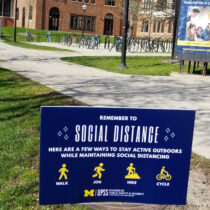Magazine

Collecting During Covid-19
How the Bentley archived the pandemic in real-time.
By Lara Zielin
Zoom meeting screenshots. Journal entries. Course assignments. Social distancing signage. Tributes to essential workers.
These are just a few of the materials that the Bentley Historical Library collected from the U-M community to help document the COVID-19 pandemic.
The library launched its COVID-19 collecting efforts in April 2020 to document the varied experiences of students, staff, and faculty during the beginning of the pandemic.
“When future students, scholars, and researchers want to understand what it was like at the University of Michigan during the pandemic, the materials preserved by the Bentley will provide a first-person account,” says Project Archivist Caitlin Moriarty, who was part of the team spearheading the project.
Bentley archivists created an online form to accept submissions, and responses came in from across campus.
Some materials showed how coursework changed when faculty and students had to complete projects and research remotely, such as the films submitted by Senior Lecturer Terri Sarris. The students in Sarris’s Introduction to Production and Wolverine TV (WOLV-TV) classes switched their final projects to document an aspect of the COVID experience.
“The projects capture the upheaval, confusion, isolation, inability to focus, absence, uncertainty, and even some hope, that students were feeling in this unprecedented time,” Sarris says.
Other materials came in as a result of Bentley outreach, including the newsletter of Environmental Services at Michigan Medicine, who clean and maintain the hospital. “This is especially true at this important moment when they are on the frontlines as essential workers,” Moriarty says.
All submissions to the project were digital. The process of asking multiple people to contribute to a specific theme represents an unusual kind of collecting process for the Bentley.
Traditionally, most people or individuals who donate to archives submit a collection of their papers or records. In this case, “people who had just one thing, such as one photo, could submit it to be part of a community-created collection,” explains Moriarty.
Moriarty says that, if successful, this could be a model that the Bentley applies to collecting in other areas.
About 150 submissions to the online form were received, and the next step is to process the materials and make them available online.
This material represents a small portion of what the Bentley will ultimately collect on COVID-19. More material will be acquired from U-M departments and units, from individual donors, and from Michigan organizations.
“One hundred years from now, it will be interesting to see what survives,” Moriarty says. “When you’re living it, it feels like everything is important, but things will filter out over time. This will become like an archival sample of that moment, sort of a time capsule in a way.”
BENTLEY QUARANTINE BY THE NUMBERS
3,530
files produced from 39 digitization requests
345
researcher email requests received and responded to
321
finding aids created
246
football films (1930–1967) inspected and prepared for the Bentley Digital Media Library
191 GB
of digital material processed
52
social media posts generated
42
new websites archived
23 GB
of digital material accessioned
15
faculty members engaged in online teaching in partnership with the Bentley since March 2020
4
issues of the new Bentley e-newsletter sent
3
virtual events hosted (and more to come)
[Caption for lead photo] A sign near Michigan Stadium in March 2020 advises sheltering in place to stop the spread of COVID-19. Image by Bentley archivist Brian Williams.
The Bentley Historical Library is currently open by appointment only for U-M faculty, students, and staff. Learn more here.
